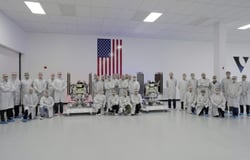Our work at NVIDIA is dedicated towards a computing model focused on visual and AI computing. For two decades, NVIDIA has pioneered visual computing, the art and science of computer graphics, with our invention of the GPU. The GPU has also shown to be spectacularly effective at solving some of the most complex problems in computer science. Today, NVIDIA’s GPU simulates human intelligence, running deep learning algorithms and acting as the brain of computers, robots and self-driving cars that can perceive and understand the world. We are looking to grow our company and teams with the smartest people in the world and there has never been a more exciting time to join our team!
NVIDIA’s invention of the GPU in 1999 sparked the growth of the PC gaming market, redefined modern computer graphics, and revolutionized parallel computing. More recently, GPU deep learning ignited modern AI - the next era of computing - with the GPU acting as the brain of computers, robots, and self-driving cars that can perceive and understand the world. Today, we are increasingly known as “the AI computing company.” We’re looking to grow our company and form teams with the more inquisitive people in the world. As generative AI continues to grow, LLM agents are being leveraged to handle increasingly complex tasks requiring planning, reasoning and memory. We're searching for outstanding interns to bring their development and data science expertise to help build our genAI suite of SDKs that enable the LLM agent ecosystem.
What you’ll be doing:
-
Implementing new features of our genAI SDKs that enable LLM agents to expand to new, more demanding use cases and deployment configurations.
-
Crafting proof-of-concept workflows rooted in first principles that apply modern data science techniques to genAI use cases.
-
Assisting in hardening of existing workflows to incorporating tracing, metrics, and benchmarking.
-
Working with data scientists and ML/DL engineers to move from proof-of-concept analysis and modeling to production-ready pipelines and deployments.
What we need to see:
-
Pursuing a BS, MS, or PhD in computer science, data science, computer engineering, or other closely related field
-
Python development experience and Python data science experience
-
Ability to quickly shift to innovative approaches, techniques, and implementations
-
Deep desire to solve complex engineering challenges with efficiency as a priority
-
Ability to work as part of a distributed engineering team
Ways to stand out from the crowd:
-
Experience with generative AI, LLM agents and LLM frameworks (such as LangChain, CrewAI, or AutoGen)
-
Displayed ability to prototype new capabilities and functionality and bring those into a production-ready environment
-
Implemented projects that incorporate LLMs or generative AI
-
Experience with open source software development, either creating new open source software or contributing to an existing project
-
Knowledge of GPU-based compute, including CUDA and RAPIDS
NVIDIA is widely considered to be one of the technology world’s most desirable employers. We have some of the most forward-thinking and hardworking people in the world working for us. If you're creative and autonomous, we want to hear from you!
The hourly rate for our interns is 18 USD - 71 USD. Our internship hourly rates are a standard pay determined based on the position and your location, year in school, degree, and experience.
You will also be eligible for Intern benefits. NVIDIA accepts applications on an ongoing basis.
NVIDIA is committed to fostering a diverse work environment and proud to be an equal opportunity employer. As we highly value diversity in our current and future employees, we do not discriminate (including in our hiring and promotion practices) on the basis of race, religion, color, national origin, gender, gender expression, sexual orientation, age, marital status, veteran status, disability status or any other characteristic protected by law.
Top Skills

What We Do
NVIDIA’s invention of the GPU in 1999 sparked the growth of the PC gaming market, redefined modern computer graphics, and revolutionized parallel computing. More recently, GPU deep learning ignited modern AI — the next era of computing — with the GPU acting as the brain of computers, robots, and self-driving cars that can perceive and understand the world. Today, NVIDIA is increasingly known as “the AI computing company.”



.png)






